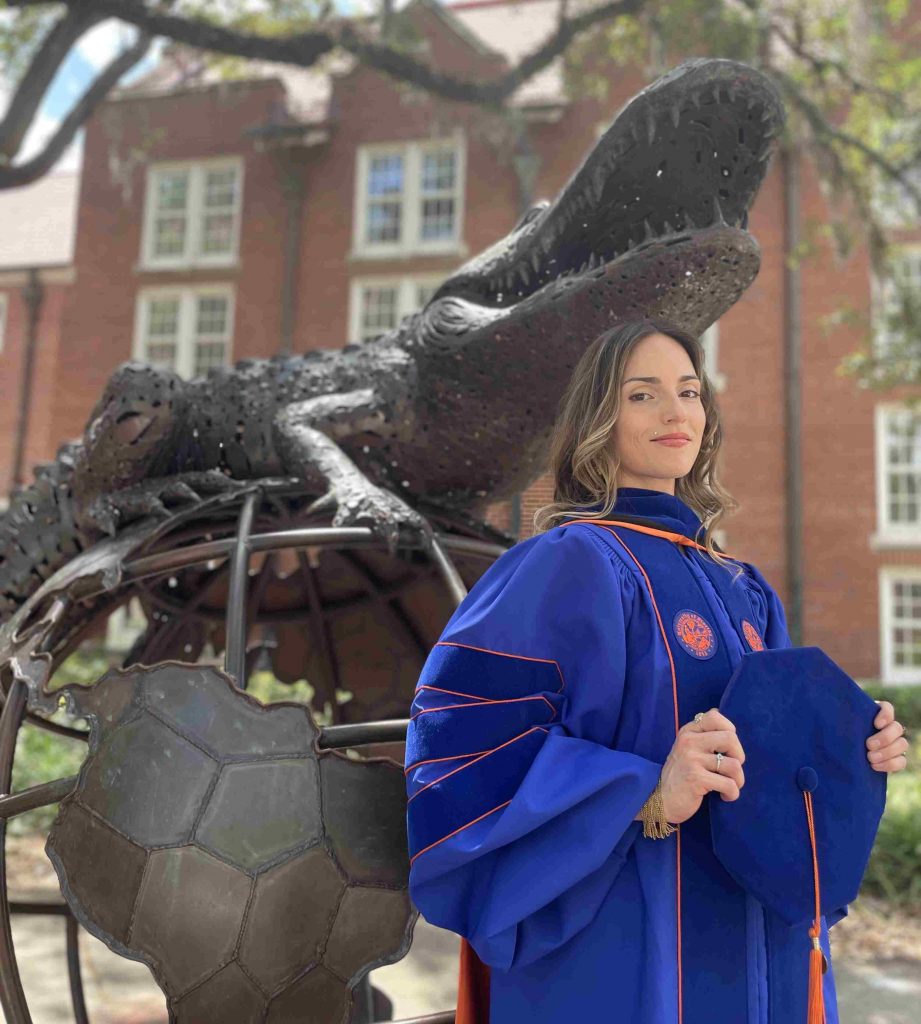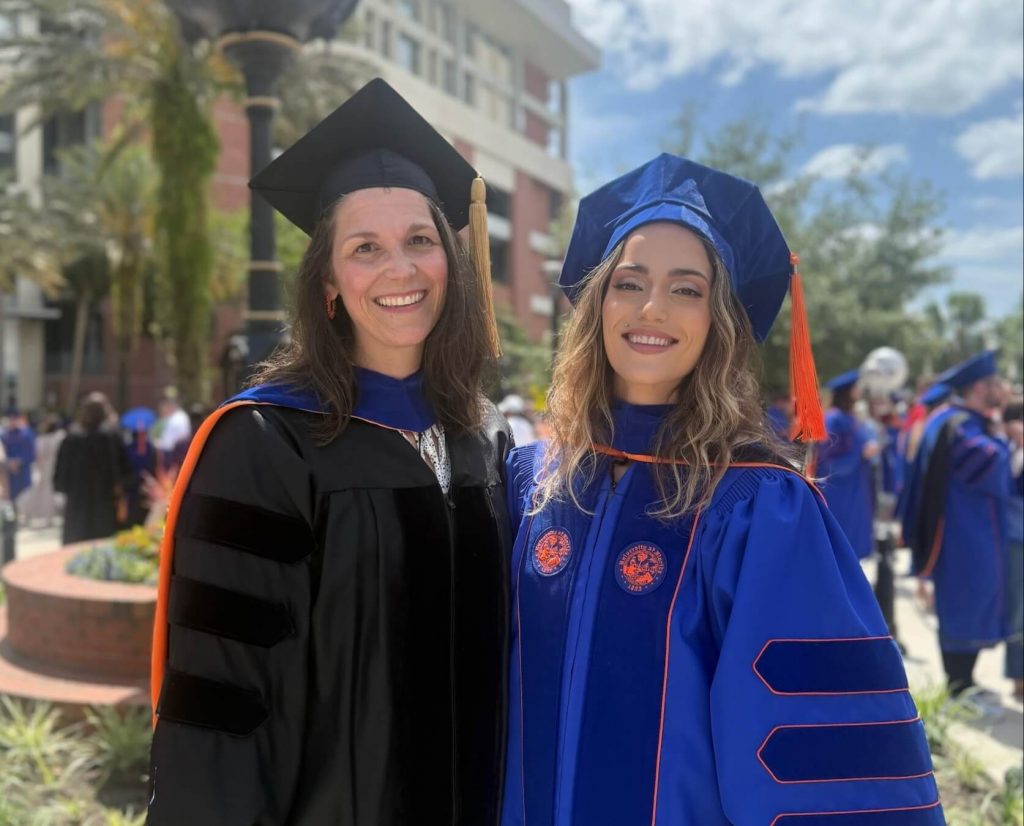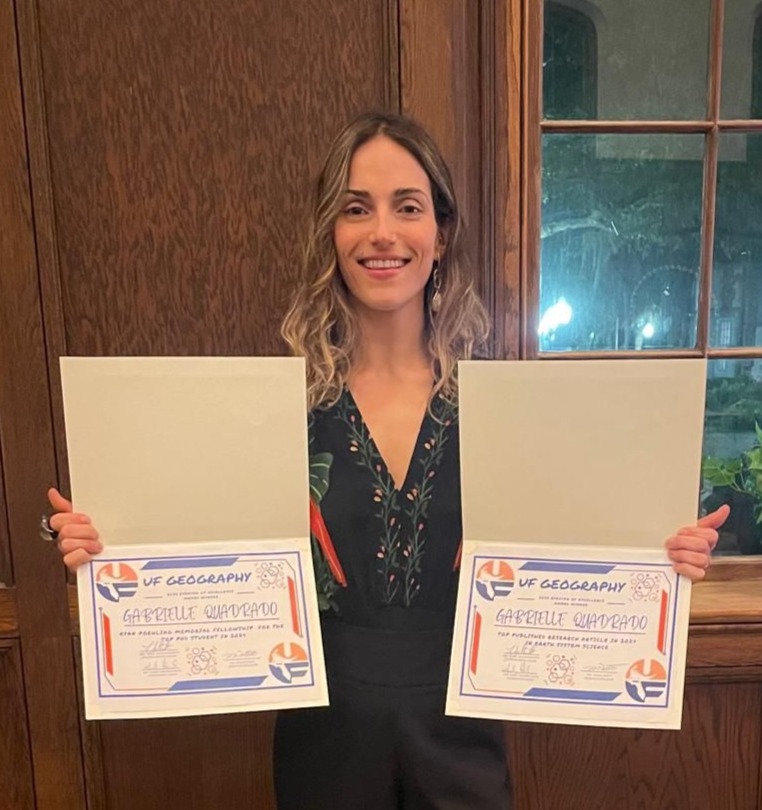By Megan Sam
When Gabrielle Quadrado first started flipping through her mom’s biology books at 8 years old, she wasn’t thinking about scientific research or earning a Ph.D. She was a curious child playing “professor,” inspired by her mom, who is both a researcher and biology professor. Years later, that early spark of curiosity became a deep and driving passion. On May 1, Quadrado walked across the stage at the University of Florida to receive her doctorate from the Department of Geography — a proud milestone that was years in the making.

“Even when you’re passionate about something, exhaustion and stress can bury that spark. Taking breaks makes space for your passion to rise again.”
Growing up, Quadrado visited the same beach in Garopaba, Brazil each summer. Year after year, she watched the stretch of coastline shrink due to rising seas and erosion. That experience stayed with her and ultimately motivated both her master’s research on coastal morphodynamics, the evolution of coastal landforms, and her doctoral work at the University of Florida. There, she focused on extreme total water levels — the combined height of tides, waves and storm surge — and how they drive coastal flooding and erosion along shorelines in the United States. Her work highlights the complex, compounding impacts of sea level rise.
Her path to a career in science wasn’t without obstacles. A year and a half into her doctoral program, she discovered a newly published study that closely mirrored her findings on total water levels. This setback forced her to pivot: she refined her focus with the same methods and eventually published in the Journal of Geophysical Research: Oceans, a prestigious publication of the American Geophysical Union.

“In academia, you need to be able to shift your perspective, otherwise you’ll feel pressure from many directions,” said Quadrado. “It’s important to let yourself feel discouraged when you need to, but it’s just as important to stand up and overcome whatever challenges come your way. When I was in Brazil, I wouldn’t have thought I’d be able to publish in such a high-impact journal. And even though it wasn’t easy at the time, I was happy because it meant others were thinking about the same questions. That showed me my work matters.”
With guidance from her advisor, Katherine Serafin, Ph.D., assistant professor in the UF Department of Geography, Quadrado found mentorship that extended far beyond research.
“Dr. Serafin inspires me because I see the same passion for coastal science in her that I see in myself,” said Quadrado. “She really cares about her students and has given me so many opportunities. We’ve written and reviewed papers together, taught classes together, and she guided me through job offer negotiations. These are the kinds of lessons you don’t always get in academia unless you have the right mentor. If I become a professor one day, I want to be like her.”

Serafin, in turn, saw an accomplished scientist and leader in the making.
“Gabi is incredibly motivated and passionate about the work she does — whether it’s troubleshooting code, writing a paper, commenting on student assignments as a teaching assistant, applying for awards, doing field work, or participating in outreach activities, she pursues opportunities with determination and enthusiasm,” said Serafin, a CCS affiliate faculty member. “Her organization, drive and collegiality cultivate success in leadership roles as a graduate student representative in the geography department and across the University as a UF Water Institute Ambassador.”
After graduation, Quadrado will join the Coastal Risks and Engineering (CoRE) Lab at the University of Central Florida (UCF) as a postdoctoral researcher. There, she’ll help provide global estimates of extreme water levels, with a focus on improving data and analysis in underrepresented regions such as the Pacific Islands. She’s especially excited about the chance to collaborate with researchers at UCF and the National Aeronautics and Space Administration (NASA) Sea Level Science team, and to give back by mentoring students in the lab.
Looking back on her time as a graduate student, she’s proud of how far she’s come.
“I’ve grown so much, especially in building connections, feeling confident, and becoming part of a broader scientific community,” said Quadrado. “It feels good to be valued. It feels good to know you’re part of something bigger than yourself.”
